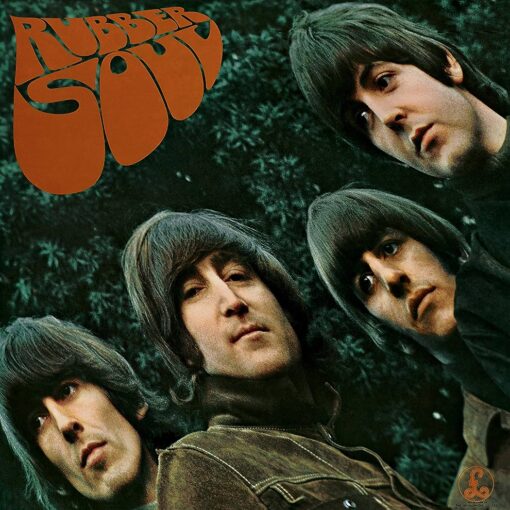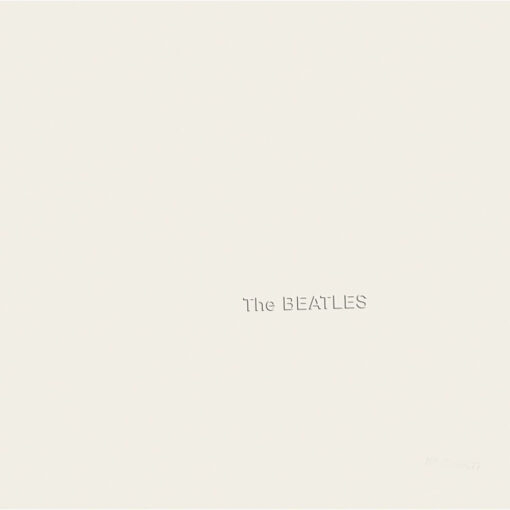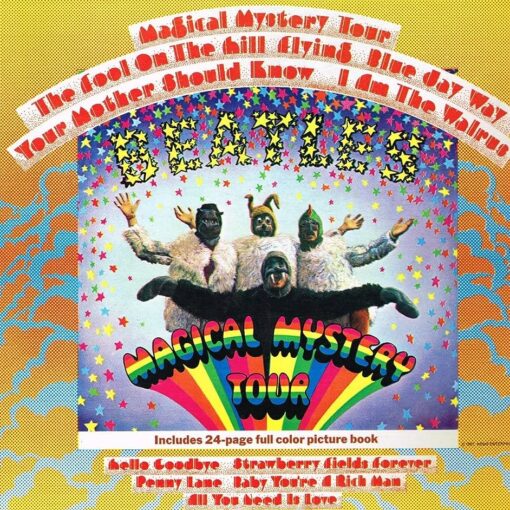Published in 1966
Author: Lennon/McCartney
Track 14 on “Revolver“
JOHN 1968: “‘Tomorrow Never Knows’ …I didn’t know what I was saying, and you just find out later. I know that when there are some lyrics I dig, I know that somewhere people will be looking at them.”
JOHN 1968: “Often the backing I think of early-on never comes off. With ‘Tomorrow Never Knows’ I’d imagined in my head that in the background you would hear thousands of munks chanting. That was impractical, of course, and we did something different. It was a bit of a drag, and I didn’t really like it. I should have tried to get near my original idea, the munks singing. I realize now that was what I wanted.”
JOHN 1972 “This was my first psychedelic song.”
JOHN 1980 “That’s me in my ‘Tibetan Book of the Dead’ period. I took one of Ringo’s malapropisms as the title, to sort of take the edge off the heavy philosophical lyrics.”
PAUL 1984: “That was one of Ringo’s malapropisms. John wrote the lyrics from Timothy Leary’s version of the ‘Tibetan Book of the Dead.’ It was a kind of Bible for all the psychedelic freaks. that was an LSD song. Probably the only one. People always thought ‘Lucy in the Sky with Diamonds’ was but it actually ‘wasn’t’ meant to say LSD.”
JOHN 1968: “‘Tomorrow Never Knows’ …I didn’t know what I was saying, and you just find out later. I know that when there are some lyrics I dig, I know that somewhere people will be looking at them.”
JOHN 1968: “Often the backing I think of early-on never comes off. With ‘Tomorrow Never Knows’ I’d imagined in my head that in the background you would hear thousands of munks chanting. That was impractical, of course, and we did something different. It was a bit of a drag, and I didn’t really like it. I should have tried to get near my original idea, the munks singing. I realize now that was what I wanted.”
JOHN 1972 “This was my first psychedelic song.”
JOHN 1980 “That’s me in my ‘Tibetan Book of the Dead’ period. I took one of Ringo’s malapropisms as the title, to sort of take the edge off the heavy philosophical lyrics.”
PAUL 1984: “That was one of Ringo’s malapropisms. John wrote the lyrics from Timothy Leary’s version of the ‘Tibetan Book of the Dead.’ It was a kind of Bible for all the psychedelic freaks. that was an LSD song. Probably the only one. People always thought ‘Lucy in the Sky with Diamonds’ was but it actually ‘wasn’t’ meant to say LSD.”
About “Tomorrow Never Knows”
“Tomorrow Never Knows” was written primarily by John Lennon and credited to Lennon–McCartney. Their first song recorded for the album Revolver, it was released as the last track on the LP in August 1966. In the recording studio, the Beatles fully utilized the possibilities of recording without considering the possibility of reproducing the results on stage.
During the writing of the song, Lennon drew inspiration from his experiences with the hallucinogenic drug LSD and from the 1964 book The Psychedelic Experience: A Manual Based on the Tibetan Book of the Dead by Timothy Leary, Richard Alpert and Ralph Metzner.
There were a number of musical elements used by The Beatles in their recording, such as musique concrète, avant-garde composition, and electroacoustic sound manipulation, all of which were foreign to pop music. A constant, non-standard drum pattern is underpinned by an Indian-inspired modal backing of tambura and sitar drone and bass guitar, with minimal harmonic deviations from a single chord; additionally, tape loops prepared by the band were overdubbed “live” onto the rhythm track. Lennon’s vocals were fed through a Leslie speaker cabinet, normally used for a Hammond organ. Although the Beatles’ 1966 B-side “Rain“, which they recorded shortly after using the same technique, was issued over three months before Revolver, the song’s backwards guitar parts and effects marked the first use of reversed sounds in a pop recording.
Its pioneering use of sampling, tape manipulation, and other production techniques made “Tomorrow Never Knows” a highly influential recording in the psychedelic and electronic music genres. Additionally, it introduced lyrical themes that advocated mind expansion, anti-materialism, and Eastern spirituality into popular music. As soon as the song was released, many fans and journalists ridiculed it. Since then, it has been praised as an effective representation of a psychedelic experience. The song was ranked number 19 on Pitchfork’s list of “The 200 Greatest Songs of the 1960s”, and number 18 on Rolling Stone’s list of the 100 greatest Beatles songs.
Meaning of “Tomorrow Never Knows”
The meaning of “Tomorrow Never Knows” is deeply rooted in the psychedelic and philosophical influences of the 1960s, particularly drawing from Eastern spirituality and experiences induced by psychedelic substances. The song is considered a pioneering piece in the development of psychedelic rock. Lyrically, the song delves into concepts from Eastern philosophies, emphasizing the impermanence of life and the interconnectedness of all existence. These themes align with ideas found in Buddhist and Hindu philosophies, indicating a profound exploration of spirituality.
It’s widely believed that the song was influenced by The Beatles’ experimentation with psychedelic drugs, especially LSD. The lyrics hint at an altered state of consciousness, with lines like “Turn off your mind, relax and float downstream” and “Lay down all thought, surrender to the void” suggesting a mind-expanding experience. John Lennon’s interest in the Tibetan Book of the Dead, a Buddhist text guiding the process of dying and rebirth, is also thought to have inspired elements of the song’s lyrics.
The song encourages a surrendering of control and an acceptance of the present moment. Phrases like “It is not dying” and “That love is all and love is everyone” convey a message of embracing the unknown and recognizing the universal power of love. In its title, “Tomorrow Never Knows,” lies an acceptance of life’s inherent mysteries and an openness to the unknown. The song encapsulates the spirit of exploration and experimentation that defined the 1960s counterculture and psychedelic movement.
Overall, “Tomorrow Never Knows” stands as a groundbreaking piece of music, embodying the era’s pursuit of new sounds and profound philosophical inquiry. Its revolutionary approach to music and spiritually-infused lyrics make it a remarkable and influential track in The Beatles’ repertoire.
Personnel
- John Lennon – vocals, Hammond organ, Mellotron, tape loops
- Paul McCartney – bass guitar, tape loops
- George Harrison – sitar, tambura, lead guitar, tape loops
- Ringo Starr – drums, tambourine, tape loops
- George Martin – tack piano




2 thoughts on ““Tomorrow Never Knows””